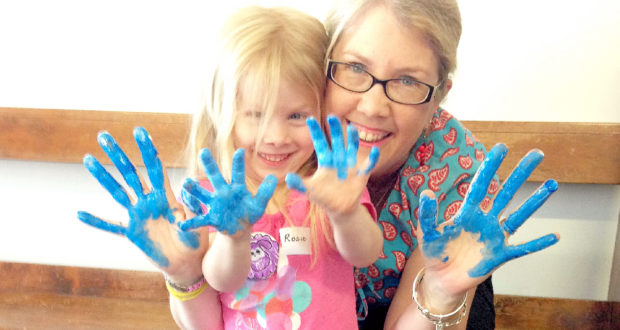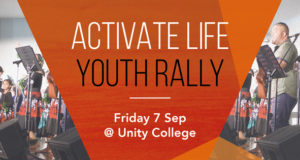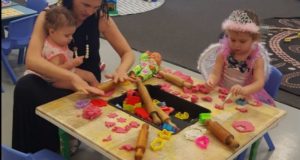Churches across Queensland are stepping out in faith to explore innovative ways to connect with local communities and to nurture children and families. Dianne Jensen reports.
Children’s pictures of Jesus usually depict him as smiling, with arms outstretched. Their bright daubs capture a child-like wonder at the divine, a reassurance that faith will be passed on to the next generation.
But like cream buns at Sunday School picnics, over the decades children have been quietly disappearing from congregations. The National Church Life Survey 2013 Uniting Church census found that 17 per cent of churches do not have any children and another 59 per cent have between one and nine children (though Uniting Aboriginal and Islander Christian Congress and migrant/ethnic churches are largely missing from the statistics).
While it’s tempting to bemoan the boom years of the 1950s and to lament the secular age, a growing number of congregations are refusing to throw in the towel. These signs of renewal can be seen across the state as congregations large and small explore innovative, flexible models of nurturing children and their families that are right for them.
Rev Beth Nicholls, Project Officer Mission for the Presbytery of South Moreton, says it all starts with re-framing how churches see ministry—not just ministry to children.
“Congregations need to have a heart for children and families,” she says. “This is not just saying ‘Yes, we want to have kids in church’, this is having a vision that places children and families at the centre of the church’s ministry, and does everything it takes to welcome and include them in all aspects of the church’s life.
“The reality is few churches prioritise children’s ministry, employ children’s ministry workers, have a budget for children’s ministry or offer training for their children’s ministry volunteers. Often children’s ministry is seen as a luxury rather than a necessity.”
Beth says that remaining locked into traditional models of children’s ministry is to miss a whole lot of opportunities.
“The question to ask is, where are our connection points with children and their families already?
“Statistics and anecdotal evidence show that more and more families value doing things as a family. Time together is precious. This means that churches have an opportunity to minister to whole families, providing places and events that allow for all ages or intergenerational ministry.”
Keep the home fires burning
The key element of contemporary children’s ministry is faith formation, and the recognition that home and family are key influencers in this process.
St Paul’s Uniting Church Stafford Faith Formation Pastor Jillian Ross says that churches need to support parents and grandparents to model faith.
“You can teach about the Bible stories and teach about God and about Jesus … but kids are watching the adults in their lives and seeing how real faith is to them. Whatever you believe and value you will be passing onto your children.”
St Paul’s Stafford At Home online portal launched three years ago, adding Lent and Advent materials last year. It offers resources for exploring the church calendar and modelling faith through conversations, rituals and traditions, acts of service and Bible reading.
“The idea behind it was that if you were on a sporting team for instance, the coach has a plan for what they want to teach,” says Jillian.
“We want to know how we can best support people to grow in faith; what are you already doing well and what would you like to do better—and how can we help?”
We’re all in this together
Redcliffe Uniting Church minister Rev Paul Clark, a puppeteer, skit writer and author whose works include the Car Park Parables, stresses the importance of creating an intergenerational culture.
“Children aren’t a side ministry—they are part of who we are,” he says.
Redcliffe Uniting Church offers a range of ministries including traditional Sunday School, Families at Five and playgroups five mornings a week. Once a month the worship service is multigenerational with participation from children and young people.
Paul is quick to point out that being creative is not the same as being merely entertaining. “Entertainment is out, Engagement is in. If you only entertain kids you won’t retain them. If children aren’t regularly part of adult worship they never learn to be. Engaging kids can be entertaining, but it must be more than entertaining.
“With kids, help them experience faith through their family and the community, ensure they always belong, and worry less about ensuring right belief or behaviour. Beliefs and behaviours develop from experiencing and belonging.”
It’s okay to be messy
Rev Adam Tipple is minister at Dalby and Jandowae Uniting churches in The Downs Presbytery; both congregations with predominantly older members ready and willing to try new ways of connecting with young families.
They chose Messy Church, a multi-age hands-on worship experience and shared meal held once a month.
“We recognised a need to reach out to new families and to have worship which is inclusive and that children enjoy being part of,” says Adam. “Messy Church is also a ministry with proven results and effectiveness, and a well-supported ministry with many resources available for little or no cost.”
Messy Church began in Jandowae in November 2017 and in Dalby in May 2018. After registering through the Messy Church website the church put a team together to ensure sustainability, chose their time slot, and advertised their launch including targeting community Facebook groups. They also enlisted Rev Beth Nicholls for a training session.
“The activities suit a wide variety of ages and interests and are set around a faith theme of the day, such as ‘the Good Shepherd’. There are plenty of opportunities to have meaningful conversations, and through the celebration time and shared meal we are able to introduce elements of worship and fellowship,” says Adam.
“Our church has been encouraged to see families from the community come and take part regularly, and by the joy of having the church full of children. Messy Church is bringing new life, and we were excited to begin the Dalby Messy Church at Pentecost!”
Recreating a community presence
The congregation at Banora Point in the Northern Rivers region of New South Wales, South Moreton Presbytery had aged in parallel with the suburb. Rev Janie French says that they were ready for a new missional focus—re-connecting with the young families in their neighbourhood.
“Our building has just turned 25-years-old. It was built here in the community before much housing even went up—so from the outset there was a prophetic insight about having a ‘God presence’ in the neighbourhood,” says Janie.
“But like so many places, fundraising took the focus and energy for the first years of its existence. Now with no debt—but also no young families, the question needed to be considered: Have we finished all God wanted to do in this place? Is it all going to die with us? We’ve decided the answer to that question is ‘no’.”
The congregation introduced Messy Church and Mainly Music (an interactive music session for families with young children) within two months of each other. They have provided different opportunities for mission.
“Thirty-two people from the congregation have been part of the Messy Church team—in terms of leadership training and discipleship, that alone is significant,” says Janie.
“Numerically, we tend to feed 40 or more (including 10 team members at any given month) at our monthly Messy Church. So that says that families have come on board. Like everywhere we compete with sport and every other pull on a family’s time, but we have a core group of six or eight families and they love to bring extended family and friends.”
Janie sees the Mainly Music group as the flagship of their mission work.
“We have a terrific leader (Joyce Pagan) who prays for the families in her own time and increasingly is given opportunity to pray with a parent or grandparent who share struggles. Pastoral care is a huge emphasis within that program.”
Bridging Mainly Music and Messy Church is an ongoing challenge, says Janie.
“We’re increasing our focus on two things: resourcing families to continue the Jesus conversations at home and helping those families see that our Messy Church congregation is part of the larger ministry of Banora Point Uniting Church.”
Finding the right fit
The evening Kids’ Church at Indooroopilly Uniting Church, Brisbane has been using a rotation program for the last 13 years. The program was adapted from an existing United States model and works through a set of stories with different workshops over a six year cycle.
Coordinator Karen Aberdeen says there are a few important differences to traditional Sunday School.
“Each story is taught over a four to five-week period, incorporating a different learning style each week. For example, the story of Joseph and his technicolour coat would include an art workshop, cooking workshop, drama and computer workshop.”
She says the use of repetition allows the story to be told and re-told over a month as well as addressing different learning styles.
“Some children are tactile and will remember the craft activity—others are visual and will remember the video or the drama workshop. The other difference is it allows for multiple teachers; volunteers only need to be scheduled once a term and the workshops are often divvied out according to our leaders’ strengths and talents.”
The current group of children ranges from Prep to Grade 6, with parents and teen congregation members rostered on for short periods.
“The evening service at Indooroopilly is one of the few evening services that offers a full children’s ministry program. This means that families with children of all ages can come along and have a program tailored to meet all their children’s needs.”
A Godly way to play
The wooden boat, sand, and collection of simple animals at Chermside-Kedron Community Church are not just toys to distract the toddlers. This is Godly Play, a Montessori-inspired program founded by Jerome Berryman to teach Bible stories to children of all ages.
Rev Brenton Prigge brought the program to Chermside-Kedron when he arrived at the end of 2017. It’s being used with a small group of children ranging from two to 13 years.
“I started using Godly Play in 2011,” he explains. “There was a conference in Sydney that was an official launch of Godly Play in Australia … I saw the potential for a method of telling Bible stories that didn’t try and impose a point of view and understanding of the story on the kids, didn’t ever moralise and say, ‘The point of this story is this’.”
Brenton’s office is packed with Godly Play shelving modules containing simple materials such as feathers, clay, stones, beads and wooden blocks. It’s all tactile and begging to be picked up—and best of all, there are no rules for how to play.
“Jerome Berryman’s assertion is that too often in the past religious education has come from an understanding of children as these empty vessels—we need to take all our knowledge and put it into their heads about God,” says Brenton. “His assertion is that children already have a spirituality they’re born with, a sense of connection to something beyond themselves, but they don’t have a language. The church has a language, but we need to find a way of connecting that language to their very real experience.”
At the heart of Godly Play is the act of wondering, a gentle process of consideration which leads the listener to wonder where they themselves might be in a story.
“That’s the place children are starting to learn to do theology and to say, how does God’s story connect with my story and where do I fit into the story of God and God’s people?” says Brenton.
A ministry for all
While there are many options for congregations, children’s ministry proponents are quick to point out that effectiveness is not about using professionals or finding the perfect program. It’s about showing children that they belong in this family of God, and nurturing the spark of wonder with which they were born.
“At the end of the day, there is nothing a child wants more than a healthy adult to invest in their life—be they a grandparent, teenager or parent,” says Paul Clark.
“This means children’s ministry can be done by almost anyone, and is not subject to fads and trends, just loving hearts.”
 JourneyOnline
JourneyOnline







